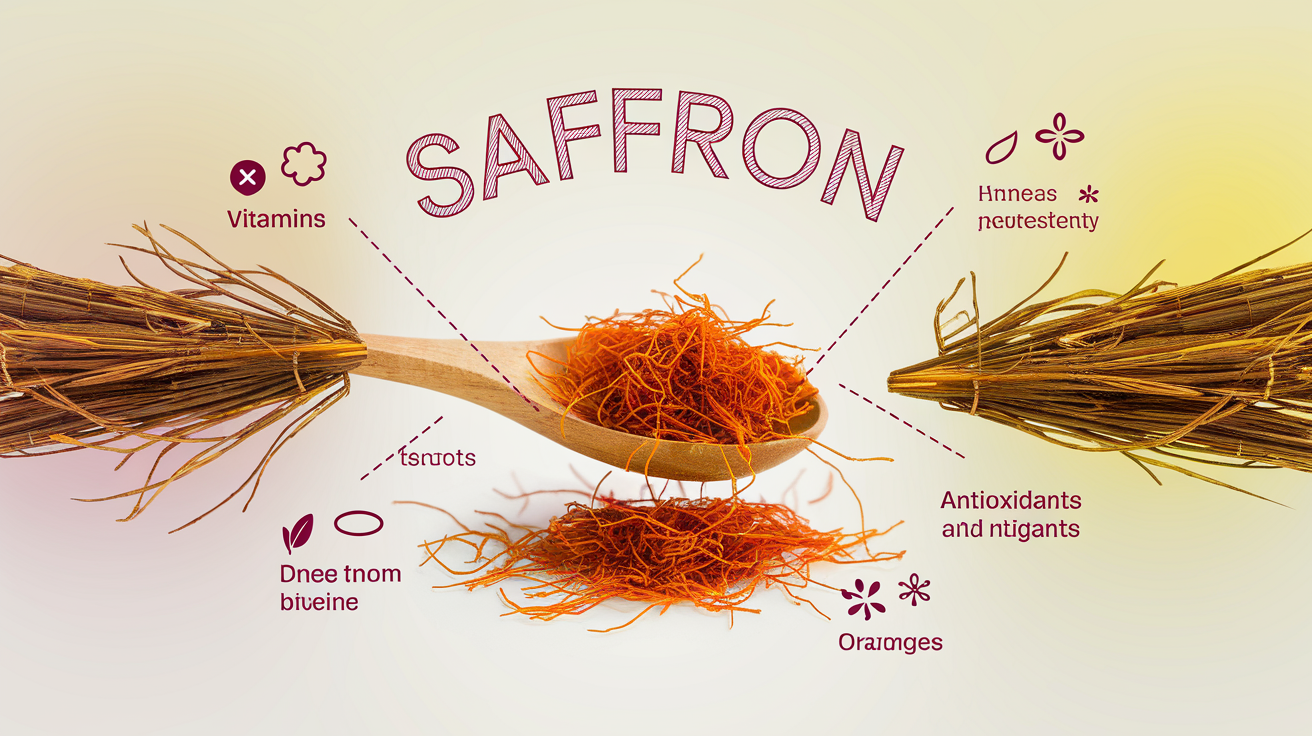
Saffron, often hailed as one of the most valuable spices in the world, owes its unique health benefits to its complex and rich nutritional profile. Though typically used in small quantities, the bioactive nutrients and composition of saffron make it a powerful ingredient for promoting overall health. These compounds contribute not only to saffron’s vibrant color and distinct flavor but also to its numerous medicinal properties.
Key Active Compounds
The health benefits of saffron can be attributed primarily to three key bioactive compounds: crocin, safranal, and picrocrocin. These compounds are responsible for saffron’s unique characteristics and play vital roles in its therapeutic effects.
- Crocin: Crocin is the carotenoid pigment that gives saffron its deep red-orange color. It is a potent antioxidant that protects cells from oxidative stress and inflammation. Studies have shown that crocin has neuroprotective properties, making it beneficial for cognitive health and mental well-being. Additionally, crocin has been linked to improved mood and reduced symptoms of depression.
- Safranal: Safranal is the volatile compound responsible for saffron’s distinct aroma. Beyond its aromatic qualities, safranal also exhibits powerful antioxidant and antidepressant properties. Research suggests that safranal may have protective effects on the nervous system, making it a valuable component in the prevention and management of neurodegenerative diseases.
- Picrocrocin: Picrocrocin is the compound that contributes to saffron’s bitter taste. It is a glycoside that, when metabolized, breaks down into safranal. Picrocrocin has been found to have antioxidant and anti-inflammatory properties, making it a key player in saffron’s overall health benefits.
Vitamins and Minerals
In addition to its bioactive compounds, saffron contains a range of essential vitamins and minerals, albeit in small quantities. These nutrients contribute to the spice’s health-promoting properties and support overall well-being.
- Vitamin C: Saffron contains small amounts of vitamin C, an antioxidant that boosts the immune system, aids in collagen production, and helps protect the skin from damage caused by free radicals.
- Vitamin A: This fat-soluble vitamin, present in saffron in trace amounts, is essential for maintaining healthy vision, skin, and immune function. Vitamin A also has antioxidant properties that help protect the body from oxidative stress.
- B Vitamins: Saffron contains several B vitamins, including vitamin B6 (pyridoxine), which plays a crucial role in brain health, mood regulation, and the production of neurotransmitters. B vitamins also support energy metabolism and help maintain healthy skin, hair, and nails.
- Minerals: Saffron contains a variety of trace minerals, including potassium, magnesium, calcium, and iron. These minerals are essential for maintaining healthy bodily functions, such as muscle contraction, nerve signaling, and oxygen transport.
Antioxidant Properties
Saffron is a potent source of antioxidants, which help neutralize free radicals in the body and protect cells from damage. The spice’s high concentration of carotenoids, including crocin and crocetin, makes it particularly effective in combating oxidative stress. This antioxidant activity is one of the key reasons why saffron is associated with a wide range of health benefits, from reducing inflammation to protecting against chronic diseases.
Calories and Macronutrients
Saffron is a low-calorie spice, with just 2 calories per 1 gram. While saffron does not contribute significant amounts of macronutrients like protein, fats, or carbohydrates due to the small quantities in which it is consumed, its micronutrient and phytochemical content make it a valuable addition to a balanced diet.
Phytochemicals and Other Bioactive Compounds
In addition to crocin, safranal, and picrocrocin, the composition of saffron contains various other phytochemicals and bioactive compounds that contribute to its health benefits. These include flavonoids and other carotenoids, which have been shown to possess anti-inflammatory, anti-cancer, and immune-boosting properties. Collectively, these compounds help protect the body against a variety of health issues, including cardiovascular diseases, digestive disorders, and age-related cognitive decline.
Conclusion
The nutritional composition of saffron is what makes it such a valuable spice, not just in the kitchen, but also in natural medicine. Its unique combination of antioxidants, vitamins, and minerals works synergistically to promote overall health, support cognitive function, enhance mood, and protect against chronic diseases. Although used in small quantities, saffron’s potent nutritional profile packs a powerful punch, making it a true superfood among spices.
